
views
In the hours after the death of American civil rights icon Rep. John Lewis, President Donald Trump took to Twitter to retweet old missives about Democratic rival Joe Biden and lash out at his former national security adviser and his niece for writing tell-all books about him.
Trump then headed to his golf course in northern Virginia with a political confidant, Sen. Lindsey Graham of South Carolina, for a nearly four-hour outing.
Shortly after 2 p.m., as Trump was returning from his golf outing — and more than 14 hours after Lewis' death was announced — he offered his and the first lady’s condolences in a two-sentence Twitter message.
“Saddened to hear the news of civil rights hero John Lewis passing. Melania and I send our prayers to he and his family,” Trump wrote.
By that point all four living former U.S. presidents, Vice President Mike Pence and scores of lawmakers had publicly remarked on the passing of the lawmaker whose brutal beating on the Edmund Pettus Bridge in Selma, Alabama, 50 years earlier marked a turning point in the civil rights movement.
Trump had battled publicly with Lewis, 80, the youngest and last living member of the Big Six civil rights activists who organized the 1963 March on Washington.
Lewis, D-Ga., memorably tangled with Trump days before the president’s inauguration in 2017. The congressman said he did not see Trump as a “legitimate president,” prompting Trump to blast Lewis as “all talk” and denigrate his majority Black district as “crime infested” and “falling apart.”
For the second time during his long service in Congress, Lewis in 2017 skipped the swearing-in ceremony. He also skipped George W. Bush's inauguration in 2001 after his contentious victory over Al Gore.
In December of that year, Lewis refused to speak at the opening of Mississippi civil rights and history museums because Trump would be there. He said the president’s “hurtful policies are an insult to the people portrayed in this civil rights museum.”
Then, as this year’s election battle heated up in the spring, Lewis threw his weight behind Biden and urged young Black voters to help make sure the former vice president wins in November.
He didn't mention Trump by name during his April endorsement, but made clear that he saw Biden's mission as a chance to “redeem the soul of America.”
Rep. Karen Bass, the Democratic chairwoman of the Congressional Black Caucus, wrote on Twitter that she hoped that Trump would stay silent about Lewis' death.
At that point, White House press secretary Kayleigh McEnany had noted that Lewis “was an icon of the civil rights movement," and Pence had issued a statement praising Lewis for his place in American history and noting that as colleagues in the House that “even when we differed, John was always unfailingly kind."
Bass wrote: “@realDonaldTrump while the nation mourns the passing of a national hero, please say nothing. Please don’t comment on the life of Congressman Lewis. Your press secretary released a statement, leave it at that."
The White House did not respond to a request for comment about Bass' statement.
The White House also issued a proclamation from the president ordering the lowering of U.S. flags at federal buildings for Lewis' death. By law the flag is lowered the day after a sitting member of Congress passes.
In some ways, Trump's perfunctory offering of condolences showed a measure of restraint compared with some past episodes involving political opponents.
The president was not invited to attend Sen. John McCain's funeral in 2018. Trump had said earlier that he didn't think McCain was a hero because the senator was captured in Vietnam. McCain was tortured and held prisoner for more than five years.
Trump seemed unable to forget one of McCain’s Senate votes in particular, the thumbs-down that sank the Republican effort in 2017 to repeal the Obama health care law. Trump was furious, and it showed even after McCain’s death. The administration lowered the American flag over the White House to half-staff, but then raised it again two days later. The flags were lowered again after a public outcry.
And Trump’s anti-McCain Twitter tirades continued long after his death from brain cancer. The president also complained that he was never properly thanked for McCain’s funeral at Washington's National Cathedral.
Trump drew criticism late last year for suggesting the late Rep. John Dingell, a Democrat, might be “looking up” from hell during a rally in Dingell's home state of Michigan.
The dig at Dingell, whose wife, Rep. Debbie Dingell, succeeded him in the House, came during Trump's impeachment. Days earlier, Trump expressed anger that the congresswoman had supported his impeachment.
“The last time I spoke to Debbie Dingell was her call thanking me for granting top memorial and funeral service honors for her then just departed husband, long time Congressman John Dingell,” Trump tweeted. “Now I watch her ripping me as part of the Democrats Impeachment Hoax. Really pathetic!”




















Comments
0 comment